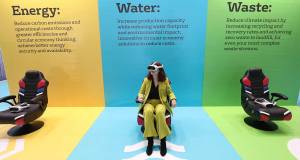
- Government
- Posted
Lobbying delays publication of pollution data on construction materials
Pressure from sectors of the building materials industry last November forced a delay in the publication of a database detailing the carbon footprint of building materials in Ireland, Passive House Plus can reveal.
The Sustainable Energy Authority of Ireland had initially been due to publish the document on its website as part of a consultation launched at a meeting with industry representatives in Dublin on 27 November, 2012. The Embodied Energy and Carbon Measurement Methodology and Database lists the carbon footprint of building materials commonly used in Ireland.
But following pressure from representatives of the building materials industry at the meeting, SEAI delayed publication and announced a closed industry-only consultation, which ended on 15 February.
A full public consultation is expected to follow, but speaking to Passive House Plus this week, SEAI's Kevin O'Rourke had no definite news on when this will be announced. He said the authority is still assessing submissions received from the industry.
At the 27 November meeting, some representatives of the building materials industry expressed concern over plans to put the database online before manufacturers and suppliers had an opportunity to analyse it.
Speaking at the meeting in a personal capacity, Colm Bannon, chair of the Cement Manufacturers Ireland environment committee said it was "quite extraordinary" that here had been no consultation with industry before the database was due to be posted online.
Mark McAuley of the Building Materials Federation, a division of IBEC, said it was unsurprising manufacturers were unhappy with the data being published before they had seen it.
Speaking later to Passive House Plus, he said both the BMF and companies it represents had since made submissions to the industry-only consultation.
"I'm hoping that [SEAI] plan to deal comprehensively with those submissions before moving on to a public consultation," he said. "I think what's required are a couple of face to face meetings with certain parts of the industry to talk about the accuracy of some of the data and some of the ways in which it's presented."
Some of the data, in his view, contains minor errors. "We don't have too many issues with it," he added. "Generally the industry has made a lot of progress in lowering the carbon footprint of its products."
He called for greater focus on life-cycle greenhouse gas emissions rather than just those associated with manufacturing, and said it would have been preferable if the database had been published alongside a method for assessing a building's carbon footprint over its whole life cycle. He said that in the absence of such a tool, the database was being launched without a context.
Other industry representatives suggested that the industry consultation period be at least six months, but SEAI did not bow to this request.
Speaking at the meeting in a personal capacity, architect Simon McGuinness said that architectural designers need good quality data on the carbon footprint of building materials. "Having an independent source of that data beyond the manufacturers' chosen figures is very important to us, so we would encourage you to be as robust as you need to be to ensure the integrity of the database," he said.
SEAI's Kevin O'Rourke stressed at the event that the database was still in development. He said it was far easier for stakeholders to react to a draft than to a blank sheet of paper. He added that the document had been through a peer review process.
However, industry figures expressed concern that even if the database was published in draft form on the SEAI website, architects and specifiers would start to use it to select products.
Following the meeting, O'Rourke sent an email to those present in which he announced a closed industry consultation. He wrote that any national assessment of embodied carbon and energy would attract "legitimate sensitivities in particular from the building materials sector".
He added that the database would prove more effective if manufacturers and suppliers were given an opportunity for detailed consideration prior to a full public consultation.
In a later email to Passive House Plus, O'Rourke acknowledged that there had been no opportunity for industry to engage with the database in detail before the meeting.
He said the decision to introduce a closed industry consultation period "had not been determined or influenced by any single industry or sectoral interest". He added: "The voices seeking a facility for such a phase of industry consultation included the representative body within IBEC for a cross section of building materials manufacturers and suppliers and a representative for the timber frame and insulation industry."
The Embodied Energy and Carbon Measurement Methodology and Database was prepared by the construction consultancy Davis Langdon and by environmental consultants Sustain, whose associate principal Craig Jones is an international authority on the carbon footprint of building materials. Speaking at the meeting, the consultants said they had been through a detailed and robust process to develop the data.
Kevin O'Rourke said the consultants had been "scientific, transparent and objective" and had followed best international practice.
The database lists the embodied greenhouse gas emissons of building materials in terms of their 'CO2 equivalent', which expresses the global warming potential of all embodied greenhouse gases by comparing it to the impact of carbon dioxide. The project also aims to set out a method for determining the embodied energy and carbon of building materials in Ireland, and a procedure for how manufactures can have data for their products listed.
The initial database contains default data for generic categories of building materials, but it is expected that manufacturers will be able to have data for their specific products and brands verified and added.
Photo by Dori
Related items
-
 Final opportunity for construction professionals to secure 80 per cent training subsidies
Final opportunity for construction professionals to secure 80 per cent training subsidies -
Study: gas cooking killing 40,000 Europeans per year
-
 Most polluting cements ruled out in Irish public procurement
Most polluting cements ruled out in Irish public procurement -
 Key industry events at Energy Show 2024
Key industry events at Energy Show 2024 -
An Post takes top prize at Energy Awards
-
Government supported almost 27,200 home energy upgrades through SEAI in 2022

